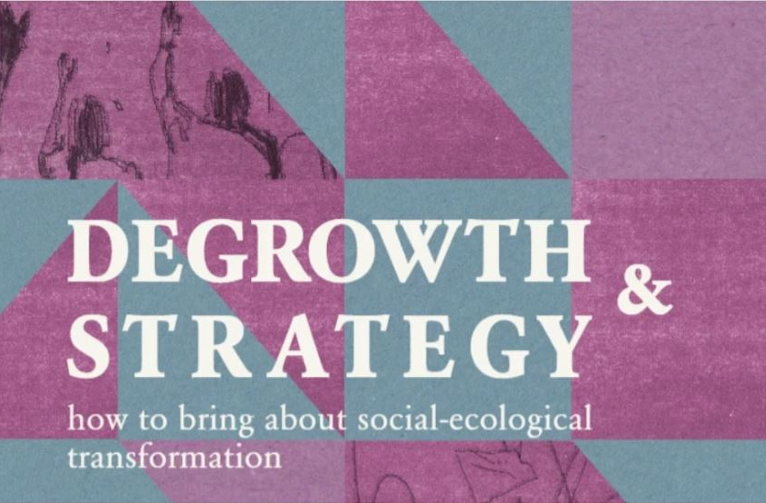Degrowth and Strategy
Barlow, N., Regen, L., Cadiou, N., Chertkovskaya, E., Hollweg, M., Plank, C., Schulken, M., Wolf, & V (Eds.). (2022). Degrowth & strategy: How to bring about social ecological transformation. Mayfly Books. Available  as paperback or a free download at https://www.degrowthstrategy.org/
as paperback or a free download at https://www.degrowthstrategy.org/
The current economic and social system is the antithesis of the Viable Economy and Society. Resting on continued material and economic expansion, it fails to provide adequately for huge swathes of national and global populations, generating inequality and poverty on the many at the same time as it lavishes riches on others. Its constant expansion has reached the limits that the planet’s multiple and interlocked systems can bear, a situation of ecological overshoot, foreshadowing societal collapse.
That we need degrowth can surely be denied no longer, but how do we get it? How can we, those who understand the predicament and the need, and who struggle for something better, how can we get rapid transformation to a just and ecologically continent economy and society?
The business as usual people have a variety of improbable technological fixes, the green growthers have the Green New Deal, with all its problems but degrowthers have, somewhat unjustly, been criticised for not having a strategy. This book is an attempt to fill that perceived gap.
It is the product of an impressive collaboration between activists and scholars from Europe, both Americas, Africa and Asia, although with a majority from continental Europe. It came out of the work of Degrowth Vienna; their regional conference in 2020 focussed specifically on strategies. However, rather than a collection of conference papers, all 44 authors have written pieces specifically for the book. In doing so they all used the framework for exploring strategic change from the work of Eric Olin Wright.
Wright distinguishes between symbiotic, interstitial and ruptural strategies. Symbiotic strategies correspond to reformist approaches that try to change existing institutions and gaining the power to do so. Interstitial strategies try to invent and promote new arrangements in the spaces vacated or less dominated by the existing power nexus. Ruptural strategies seek to break with the existing institutions and social structures. They map loosely onto social democratic, anarchist and revolutionary approaches, but can’t be reduced to them. In an early and stand out chapter, Ekaterina Chertkovskaya relates these three to five of Wright’s later notions, resisting, escaping, taming, dismantling and smashing. She adds two additional ones, building alternatives and halting, and puts them all into a matrix, a “strategic canvas” for degrowth. This could look a bit rigid but as she explains, and several other authors demonstrate, the distinct modes interact, one, such as “building alternatives” can, under the right conditions increase capacity for “resisting” and “taming” and even lead to ruptural change.
Unfortunately, with the same framework used throughout the book, it can at times become rather over-formulaic, as at times the reader might have the suspicion of ‘writing by box ticking’, as authors put their examples into the pigeon-holes of Wright’s more basic three-fold conceptualisation. However, Chapters by Brand on emancipatory strategy, Koch on the State and Civil Society and Paulson on Strategic Entanglements I found thought-provoking.
The book covers a great deal of ground, especially in part two “Strategies in Practice”, with chapters on food, housing, technology, energy, mobility and transport, care, paid work, money and finance, and trade and decolonisation. I particularly liked chapters by Heindl on housing, Kreinen and Latif on paid work (with a case example on Gatwick airport), Aigner, Buczko, Cahen-Fourot and Schneider on money and finance, and Oyo on litigation in decolonial resistance.
Such a large piece of work (406 pages of quite small type), is bound to be somewhat uneven, and what seems plodding to one reader will enlighten another (and vice versa). I commend the team on a real achievement, one that anyone committed to a post-growth, degrowth, or steady state future will find useful, and which is likely to be a reference point for some years to come as we continue to struggle for a Viable Future for all.





